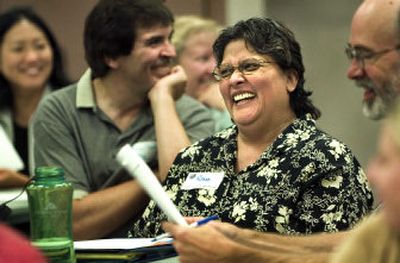Activists call for more diversity in Spokane

It’s been nine years since racist incidents at Gonzaga University prompted Spokane to say “no to hate” in an annual congress on race – time enough to move beyond a discussion of the morality of diversity, according to civil rights activist Ben Cabildo.
“We need to deal with the economics of diversity,” Cabildo, founder and director of AHANA Business and Professional Association, told the annual Congress on Human Relations on Friday.
“I’m grateful for what you have done,” he told about 200 people gathered at Spokane Community College Lair Auditorium. “But I am not satisfied.”
Lack of diversity, a condition that many believe has slowed the Spokane’s economic development, should no longer be an intellectual discussion, Cabildo said. “It impacts our lives every day.”
It can be seen in the low science and math scores and high dropout rates of minority students, he said. By 2015, it will be evident in the lack of trained workers available to fill an estimated 20 million new jobs and 32 million jobs left vacant by retiring Baby Boomers.
Friday’s human rights event was perhaps another example of preaching to the choir. Most participants already understood what the Rev. Robert Spitzer, president of Gonzaga University, called “that love, that empathy without which our future will not proceed with grace and beauty.”
But to some, such as Vince Lemus, equal employment opportunity coordinator for Eastern Washington University, the message of tolerance can never be overstated.
“Even the choir needs to be here,” Lemus said after presenting a workshop on “intercultural competency.”
In another speech Friday, V. Anne Smith, president of the Spokane Branch of the National Association for the Advancement of Colored People, stressed the importance of protecting voting rights, which she said have come under attack of late.
She cited as examples the disenfranchisement of people of color in Florida in 2000, in New Orleans after Hurricane Katrina and “pick a party” ballots in Washington state primaries.
“You must vote your values and value your vote,” Smith said.
Smith and Cabildo were joined in presenting keynote addresses by Richard Villalobos, SCC liaison counselor for environmental sciences and professional technical education, who spoke of the rights of persons with disability.
“Civil rights for us came in the ‘70s,” said Villalobos, who sustained a spinal cord injury in 1981. “We weren’t worried about sitting at the back of the bus. We couldn’t get on the bus.”
It is the stigma of disability that must be overcome, he said, citing the example of Otto Zehm, the 36-year-old mentally ill man who died after a confrontation with Spokane police in a North Side convenience store.
“It’s the community that needs rehabilitation, not the person,” Villalobos said.